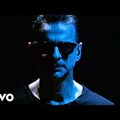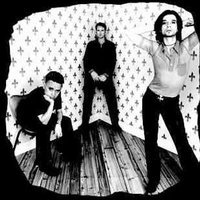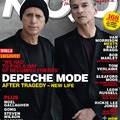The key difference on Spirit, it would seem, is that the trio are actively looking outward rather than looking deeper inward, assessing the world and its reality in addition to the cracks and dents it places on the soul that rests within. Depeche Mode hit a peak in the mid-‘80s, exploring their own world that seemed just one or two darker shades away from the pop machine, yet still so inherently tied to it. They discussed faith, suicide, sin, control, power, obsession, and more, all through a series of unstoppable radio-ready hooks. They made the sacrilegious “Personal Jesus” into a smash hit and infected dance floors across the world for decades with the bondage-dominated “Master and Servant”. Their music celebrates wounds and scars, looking deeper and deeper at them until you sink right through the skin. With their new album, though, the spirit has escaped the dermis, and Depeche Mode are out in the barren wasteland, searching for where it’s gone and finding a way to convince it to return.
That fight for the last shreds of society’s spirit is apparent on the phone as well, though, of course, without the anthemic melodies of the album. Both Gore and Andy Fletcher look at this new album as a powerful statement from their iconic band, and it really translates. “In some ways it couldn’t have come out at a better time,” Gore says. “But if it had come out six months ago, it would’ve still worked because the world was still a mess. It’s just plummeted even deeper into the abyss.” Even among all that darkness, though, the two are quick to laugh, chuckling when looking back at their legendary career and finding the lunacy of today’s political spectrum equally ludicrous.

Do you feel like the break between albums has been really conducive toward your writing and creativity?
And it’s so easy to underestimate the power of that lifestyle and having that momentum when you’re first starting out. The sheer volume of material you carry in your catalog is emblematic of that hard work. Martin, you specifically, have written so many songs. It’s as if your passion is perfectly aligned with how this record sounds, its name, fittingly describing the feeling of “spirited.”
Gore: You know, I’m lucky. I fell in love with music when I was young, when I was a kid, really, at about 10 years old. I wasn’t playing music, but I got into it by simply listening to records. That was my one driving force, really. It’s still like that to this day.
Then after all these years, do you still get a buzz before releasing a new record?
Andy Fletcher: Oh, yeah! Our release pattern over the last 20 years has been that we work in cycles of four years. So, we have time off with our families; we go on tour. It’s a much more relaxed schedule than the ‘80s or the ‘90s, where we were working constantly. That was very tiring. No, we’re really excited and looking forward to going on this tour.
Talking about all those crazy times back in the ‘80s, was there a time where it crossed your mind that what you were doing was meaningful and you were going to become such an iconic band?
A few years back, I met Daniel Miller [founder of Mute Records], and we were chatting about you guys and how he found you during a soundcheck in which he described your music as “fucking incredible.” But when he approached you, did you have any other interest from labels?
Fletcher: We had all the major labels around offering us lots of money. For some reason, we chose a man that was offering us no money, but we liked the music of his label. So, I think if we had taken the other decision and signed for a major, I might not be here talking to you.
Fletcher: [Laughs] I definitely said that tongue in cheek.
But you play multiple instruments, don’t you?
He ordered it?
Fletcher: Yeah. So we had to all buy synthesizers. And then we became an electronic band.
Fletcher: But I had no keyboard training! [Laughs]
I always wonder how genres age. How do you adapt dance and electronic music to the present while retaining the core essence of Depeche Mode?
Fletcher: We try to push ourselves. Everything’s done in a quite natural way, to be honest. Martin writes his songs; Dave writes his songs. We go in the studio. We don’t think, “We better sound modern.” It just comes. It’s natural.
Gore: But being a fan of music in general, if you listen to all kinds of music, from all different decades, in all different genres, somehow it gets filtered through and something new comes out. It always baffles me how people just want to sound like everything else that’s around right now.
It’s no secret that musicians are often self-critical and competitive about their work. I think it’s a universal feeling across the board with anyone creating something new. But once you became a cult icon, are those qualities still around? Has there ever been a moment when you were like, “What am I doing? I can’t do this!”
Gore: Yeah, there was one period, just before I started writing for Exciter, I think. I felt that I was just struggling a bit, which is not bad, really. Especially considering we’d been around for so long.
Fletcher: There was a time when Dave was in a pretty bad way, and we were making Ultra. At one point, me and Martin said, “We’re never going to finish this. Is this the end of the band?” Then Dave got his act together and became clean. Then we did okay. That’s about the only time, really.
I suppose there’s this invisible responsibility to be on the right track, to be okay if you’re in the limelight. Everyone thinks that just because you’re up on stage, you’re confident and you know what you’re doing.
Fletcher: I think when you see groups on stage, you don’t really know what’s going on. Dave, for instance, you see Dave on stage, and you think this is the most confident man in the world. But he’s really nervous before he goes on stage. [Laughs] It’s the adrenaline. That’s the thing.
Fletcher: I think music is very powerful. I don’t think you could topple presidents with music, but I think people at the moment are more tuned into politics than they were five years ago.
Everyone is quite hesitant to call it a political album because that’s tainted with a certain meaning, and then all of a sudden you have the will and motivation to speak up.
Gore: And these songs were actually written about two years ago in 2015, maybe halfway through the year.
Gore: I think I’m okay with whatever label. If people want to call it political, that’s fine. I’m trying to get people to think, and this album talks about topics that are looking outward at the world, which makes it what could be termed political.
You had a new producer, James Ford, coming in. Was it better to have that outside force?
Gore: I think it was something that we needed to do. We were trying to make a change, even though we loved working with Ben Hillier. We had made three albums together, and sometimes it’s good to shake things up and challenge yourselves a little bit. It was different working with James, but some things worked amazingly better in some ways. We finished really quickly. I think we had the whole thing finished and mixed in three months. We were able to cancel a six-week period that we had booked in New York, which was huge for us; we’ve never done that before ever.
Yeah, I really think that he achieved something fantastic. There are so many hidden layers that you might even miss the first time you hear the songs.
Fletcher: That’s the important thing with Depeche Mode. The more you hear a song, you start to hear all the different melodies and rhythms coming out.
And yet one of the most thrilling and captivating moments is during the album’s closer, “Fail”. It feels like halfway through there’s this shift in tone and sentiment, and then lyrically as well.
That reminds me of how during the song “Going Backwards”, you say: “We have nothing inside/ We feel nothing inside.”
Gore: It’s true. Some of the lines in the songs talk about watching someone get killed via satellite, and it’s like, “Oh, yeah, well, someone else just died.” We are just completely dulled now. Technology now is really unbridled, and we’re going into areas where I don’t think everyone’s really talked about how it affects the human being. It’s available, and we can use it, but how does it actually affect us? But at the same time, with the technology that we have and news outlets being able to reach the whole world within a second, we still have over here in America a president who just says, “Oh no, that’s not happening. That’s fake news.” [Laughs] It’s crazy. The technology we have to be able to verify everything as being real, now it’s just got to the point that you just say, “Oh, no, that didn’t happen.”
It’s complete madness. It’s lunacy. I don’t understand any of it.
Gore: It sometimes feels like we’re some aliens in video games at the moment, because every day there’s something crazier going on. Just when we thought things couldn’t get any crazier, we had Richard Spencer claiming we were the band of the alt right. From his whole belief system, he’s got something wrong. He’s obviously just off altogether.
Gore: I know that the majority of the songs I write will sound better with Dave singing them. That’s not putting me down; it’s just that his voice is more suited to the majority of my songs. There’s usually a couple of songs per album that I end up singing, whether they fit my voice more, or my voice works better in them anyway.
Is there one that you’re particularly proud of?
Gore: That’s a good question. There are songs that I like because they’re different. I like “Scum” because it’s different for us, and I actually like “Eternal” because it’s weird. [Laughs]
In what way?
Fletcher: I still think the things that happened in the early days, because we didn’t really expect to become pop stars. So, the first single being released, “Dreaming of Me”, which for us was amazing. We had no idea that 35 years later we’d still be here.




